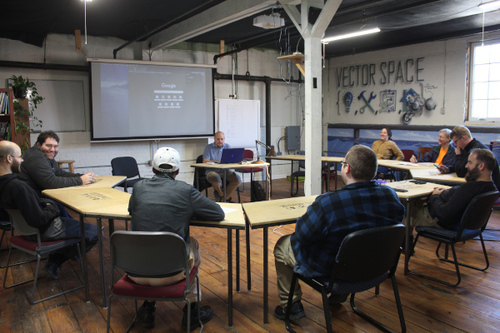Lynchburg Computer Club
Speaking to your neighbor, even in the age of computers
March 2019
I started a computer club in 2019 that brought together a variety of professionals to share their knowledge and ideas. I wrote about it here, but will repost below.
My own talk in 2019 was about computer vision using OpenCV, and the challenges and potential solutions of detecting water.

What does a group of typically highly paid and highly educated people nerding out over computers do for our city? Well first of all, communicating with knowledgeable people from a variety of fields in informal settings to discuss technical topics is a guaranteed way to expand the knowledge of the participants. Smarter and more connected professionals help our community thrive, which hardly needs to be explained. But instead of highlighting what this does for professionals, I want to focus on the benefits a group like this will have for the whole community.
If you observe a class in your local school, you'll see that computers aren't being used the way professionals use them; as tools to solve problems, to bring our creative ideas to life, or as tools for computation. Instead, they serve as test taking apparatus, a more efficient means of drilling exercises and testing than can be done with paper. And that's it. With the exception of a select few students taking specialized classes in high school, the only computer programming being done is as Seymour Papert put it, "using the computer to program the kid". And the effect is clear, there's a cultural phobia of computers that undoubtedly stems from a lack of understanding. It was true when Papert said those words in 1980, and it's every bit as true today. It's reflected through the public's understanding of computers and in the declining rate of completed computer science degrees.
Even without a visit to the schools or a deep dive into the data, you've probably had a glimpse of the problem while inside the walls of your institution. The new hires look every bit the same as you do, the only difference being that they seem so much less prepared than you were. Same people, less knowledge. I know, it's a cliche, romanticizing past generations and criticizing the new, including the easy target of our schools. But when we work behind closed doors, whether it's in the office or in our basements, our progress is only visible to those already in the know. To everyone else, you and the things you're working on don't exist. It's not that the public doesn't want to care, it's that we don't even give them the chance to care. They don't understand what we're doing, we don't tell them, so they go on not asking or caring, and the cycle continues, attracting the same select few that just happened by chance to be exposed to the field in a positive way.
If we want people to treat computers like we do, then we need to show them how it's done, we need to lead by example in a public setting and invite others to see. This is a major motivation for Vector Space in general, as this issue of hidden work is certainly not a problem unique to computing. The stereotypes of who does woodworking, sewing, metal work, etc. are well known and unlikely to change if they continue to happen in a vacuum, where skills never transfer to anyone different, they simply pass down through families and sometimes close friends. I've only chosen computers as my focus for this particular club because I so thoroughly enjoy them, and because I have a strong urge to help shape their cultural understanding and value.
If you want to see change like I do, this is your chance. You may think it's small, but if you, the computer scientists and enthusiasts, aren't willing to share your passion, then nothing will change. Because right now, the people who are willing to come out of their caves and share what they know rarely have your background, they aren't able to see or articulate the importance of this thing you know so dearly.
The ingredients for making Lynchburg a thriving community of intellectual thought are here: people with knowledge, from a variety of industries and academic fields, living in an easily navigable, small city, with a low cost for innovation, and access to what I believe (clearly with bias) is the perfect venue for bringing such people together.